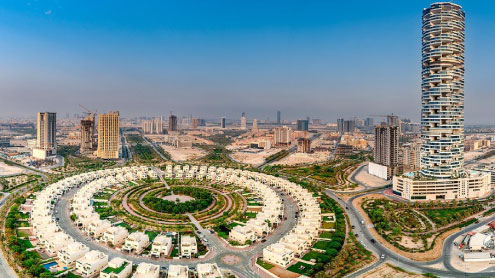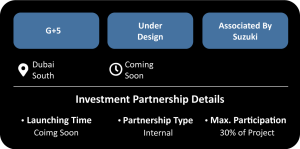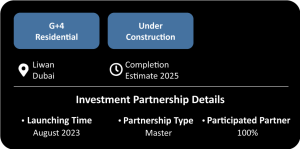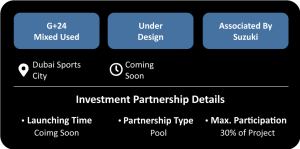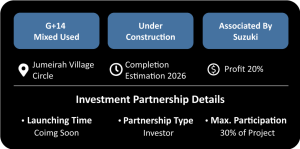Part 1

If you’re an investor or off-plan buyer looking for guidance on selecting a successful and profitable project in Dubai, then this blog is tailored just for you. In Dubai, over the past two decades, numerous projects have been initiated, with some satisfying client expectations while others resulted in failures. When investors engage in an off-plan project, they commit to payment obligations to the development company, risking forfeiture of payments if their payment fails. On the other hand, Despite the promises made in project presentations by developers, there’s no guarantee of meeting those commitments. The fancy and luxurious project catalogs, along with the exaggerated advertisements of some agents, primarily aim to accelerate sales rather than fulfill promised commitments to off-plan buyers.
Nevertheless, developers must manage significant progress and coordinate with multiple parties involved in development affairs over a minimum two-year development period, navigating various risks and uncertainties throughout the journey.
Part 2
How property development companies in Dubai operate:
In part one, we explored the risks of buying off-plan due to projects often failing client expectations. Now, we’ll focus on evaluating property development companies. First, let’s understand
Before a property development company can undertake a project, it needs to conduct a thorough feasibility study. This study evaluates aspects such as the location of the plot, financial arrangements, profitability, and potential risks associated with the project.
Success in property development depends on the developer’s experience, capabilities, and skills, combined with comprehensive risk analysis and precise forecasting. These elements enable developers to navigate through crises like the global recession in 2008.
While developers must navigate project challenges effectively, many prioritize attracting clients with exaggerated offers rather than ensuring their capability to deliver as promised. This tendency often leads to compromises in project delivery deadlines and quality. Consequently, even when developers manage to deliver the project, many off-plan buyers are left dissatisfied.
Part 3
Many developers promote lavish pre-construction projects, promising to deliver them with high-quality finishes by a specified deadline. Achieving this goal requires the developers to collaborate with various parties, as illustrated below:
- Design consultancy firms specialize in obtaining architectural and engineering requirements
- Firms function as specialized teams dedicated to providing detailed designs for high-end finishing purposes.
3. Interacting with government authorities regarding development affairs
- General contractors oversee project construction, coordinating with over 20 subcontractors, including those specialized in civil, mechanical, electrical, aluminum and glass, joinery, and more.
- Utilizing diverse supply chains to source materials for the project, including concrete suppliers, tile providers, and other necessary resources.
- Additional stakeholders involved in the development project include legal advisors, finance professionals, IT specialists, marketing teams, real estate agents, buyers, and others.
Indeed, each participating party in a development project often prioritizes its own interests, which may clash with the developer’s commitment to off-plan buyers. Moreover, coordinating among different parties can prove challenging. Unexpected crises, funding issues, disputes, or dishonest participants can exacerbate these challenges. Effectively managing all these difficulties demands careful attention to numerous parameters and adept problem-solving skills.
It’s crucial for developers to continually enhance their qualifications, capabilities, and experiences to effectively tackle the challenges of development projects. Capability and expertise are paramount in this business. The more empowered the developer, the greater the chance of successfully delivering the project.
https://www.instagram.com/reel/C5QJoHtR_Zg/?utm_source=ig_web_copy_link
Part 4
In episode three, we talked about how developers work with many different parties during project development, which can lead to various risks. So, let’s break down some of these risks.
- Conflict of interest can arise when the goals of the parties involved in the project differ from those of the developer. While the developer may prioritize delivering a project with high-end finishes, subcontractors may prioritize, potentially driving the project to failure in quality and finishes.
2. Miscoordination can occur when various parties involved in a project development operate independently, even under the supervision of project management. This lack of coordination can lead to errors and the need for rework.
3. Lack of sufficient knowledge and qualifications among involved parties can lead to issues. Design consultancies or interior designers may lack guidance on construction procedures or knowledge of suitable materials for specific interior works. They might also be unaware of local regulations and procurement options. Conversely, contractors may struggle to comprehend the designers’ instructions and drawings due to their own lack of qualifications
4. Deception and cheating are prevalent in project development. If developers lack integrity and sell off-plan projects indiscriminately, they may not honour commitments to procure materials as promised. Design consultants might manipulate material quantities or specifications on the tendering stage to get awards from their favor contractors. Similarly, contractors could cheat by using cheap materials, compromising standards, and neglecting essential project progress during the project development.
5. There are numerous other risks associated with project development, including material inflation during construction, disputes between involved parties, inadequate funding to complete the project, unexpected variations from stakeholders, the threat of bankruptcy, economic recessions, and force majeure events, all of which could significantly impact the project.
A proficient developer must anticipate and assess all potential risks and influencing factors, and possess the capability to devise effective solutions to ensure the successful delivery of the project.
Part 5
How can property developers manage risks during the development process and meet the expectations of off-plan buyers?
In previous episodes, we discussed why many off-plan buyers are dissatisfied with developers not delivering projects as promised. Additionally, we highlighted some of the risks developers face in project development. In this episode, our focus will be on how developers can better fulfill their commitments.
- Being honest
Developers should propose projects based on their capabilities and experiences. Unfortunately, many developers resort to exaggerated advertising to sell projects off-plan, often without the necessary expertise to fulfill commitments regarding design, high-end finishes, funding, and risk management.

- Capability
The developer must possess sufficient capabilities to fulfill their promises, including having adequate funds to sustain the project regardless of the success of off-plan sales. They should also be well-versed in all aspects of development and project roadmap.
- Expertise and experience in developing business
Adequate knowledge in development is the primary factor in delivering projects with minimal risks. This includes forecasting upcoming market trends and inflation, as well as being aware of the various challenges developers encounter during the development process.
- Credibility
A developer needs an impressive portfolio and tracks record to build strong networks and gain access to resources. This also helps in persuading off-plan buyers to engage with the developer.
- Properly selecting stakeholders
Properly selecting stakeholders to participate in the project development is a critical factor for developers. Choosing unqualified designers, contractors, and marketing teams can cast doubt on the project’s success.

- Risk Mitigation
As previously mentioned, the development business involves numerous risks, including conflicts of interest among stakeholders, insufficient forecasting of factors affecting project development, and unforeseen force majeure events. A qualified developer must anticipate and mitigate these risks.
Beyond the factors mentioned earlier, there are additional criteria that only capable and qualified developers, who provide accurate information and honesty to off-plan clients, can meet to successfully deliver projects.

















